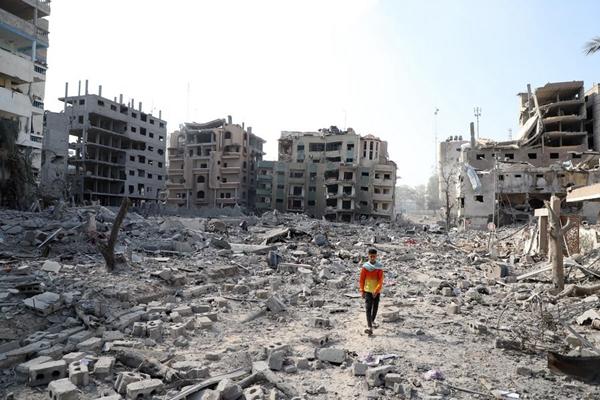

The Israeli military chief said Thursday that Israel seeks an end to the rule of the Islamic Resistance Movement (Hamas) in the Gaza Strip, targeting its senior leaders with days of heavy bombardment, which has caused more than 1,500 deaths in the Palestinian enclave.
As massive airstrikes on Gaza killed three senior Hamas members and entered the sixth day, Israel Defense Forces (IDF) Chief of Staff Herzi Halevi said the Hamas leader in Gaza, Yahya Sinwar and the group’s leadership “are dead men walking.”
The IDF said Israel would no longer allow the Gaza-ruling faction to exist as an entity with a mutual border.
“Unlike other operations, we are seeking to topple Hamas,” said IDF Spokesperson Daniel Hagari in a televised statement.
Israel has mobilized 360,000 reservists on the border with Gaza over the past few days, raising suspicion about the possibility of a ground attack on Gaza.
In six days of Israeli airstrikes against Gaza, at least 1,537 Palestinians, including 500 children and 276 women, were killed, according to the Ramallah-based Palestinian Health Ministry.
Moreover, residents in Gaza are facing worsening living conditions. The UN’s World Food Programme (WFP) warned that food and water in Gaza would run out very soon, plunging the besieged enclave into “a devastating situation.”
“We are seeing shortages of fuel, water and electricity. We are seeing overcrowded shelters,” the agency wrote in a post on the social platform X, formerly known as Twitter.
The International Committee of the Red Cross has issued a statement confirming its engagement with both Hamas and Israel in an effort to facilitate negotiations for the release of approximately 150 hostages who were abducted to Gaza days ago.
U.S. Secretary of State Antony Blinken arrived in Israel on Thursday, pledging support and more weapon deliveries for Israel’s efforts in combating Hamas.
In a live broadcast statement, Blinken said more shipments of U.S. arms were “on the way.”
Earlier this week, the USS Gerald R. Ford Carrier Strike Group, including an aircraft carrier, arrived in the Eastern Mediterranean Sea “in order to deter any actor seeking to escalate the situation or widen this war,” said the U.S. Central Command in a statement. A second U.S. aircraft carrier is heading to the Mediterranean for a “long-scheduled deployment,” according to the White House on Wednesday, while a U.S. cargo plane carrying the first shipment of advanced weaponry had landed in the country.
Lambasting that “Hamas should be treated exactly the way ISIS was treated,” Israeli Prime Minister Benjamin Netanyahu urged the international community to cut ties with Hamas.
Blinken also met with Israel’s wartime cabinet, which brought Benny Gantz, Israel’s former defense minister and leader of the center-right National Unity Party to Netanyahu’s nationalist-religious coalition government.
The cabinet was formed as the Hamas-Israel conflict was heightened. The Israeli Air Force carried out “a wave of strikes” targeting the Nukhba elite forces of Hamas, striking operational command centers used by operatives who infiltrated the communities in southern Israel on Saturday, according to a statement released by the Israeli military.
Besides, Israeli missile strikes targeted both international airports in Syria’s capital Damascus, and its northern province of Aleppo on Thursday, rendering the airports temporarily out of service.
The Syrian army said in a statement that the attacks are diversionary tactics of Israel to shift attention away from its ongoing operations in Gaza.
The attacks came as Iran’s Foreign Minister Hossein Amir-Abdollahian is scheduled to visit Syria on Friday, adding to the explosive situation in the region.
Also on Thursday, occasional firing of rockets at towns and villages in southern Israel continued, sending hundreds of thousands of residents to seek shelter. At least four individuals sustained serious-to-moderate injuries, according to Israel’s Magen David Adom rescue service.
The number of fatalities in Israel since the beginning of Hamas’ surprise attack has reached at least 1,300, Israel’s state-owned Kan TV news reported.
Efforts to recover more bodies in southern Israel were underway, and, according to Israeli authorities, the identification process has been slow due to the condition of the bodies.